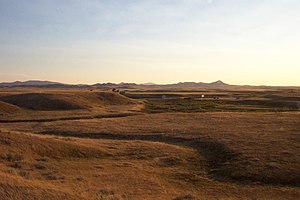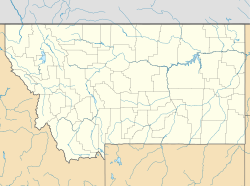Battle of Bear Paw
| Battle of Bear Paw | |||||||
|---|---|---|---|---|---|---|---|
| Part of the Nez Perce War | |||||||
 Bear Paw Battlefield |
|||||||
|
|||||||
| Belligerents | |||||||
| United States of America | Nez Perce | ||||||
| Commanders and leaders | |||||||
|
Nelson A. Miles Oliver Otis Howard |
Chief Joseph Looking Glass † Ollokot † White Bird Toohoolhoolzote † |
||||||
| Strength | |||||||
| 520 | 700 <200 warriors |
||||||
| Casualties and losses | |||||||
| 24 dead 49 wounded (including 2 Indian scouts) |
23 men and 2 women killed 46 wounded 431 surrendered or captured |
||||||
|
Chief Joseph Battleground of the Bear's Paw
|
|
| Nearest city | Chinook, Montana |
|---|---|
| Coordinates | 48°22′39″N 109°12′26″W / 48.37750°N 109.20722°WCoordinates: 48°22′39″N 109°12′26″W / 48.37750°N 109.20722°W |
| Built | 1877 |
| NRHP Reference # | 70000355 |
| Significant dates | |
| Added to NRHP | October 6, 1970 |
| Designated NHL | June 7, 1988 |
The Battle of Bear Paw (also written as Battle of the Bears Paw or Battle of the Bears Paw Mountains) was the final engagement of the Nez Perce War. Some of the Nez Perce were able to escape to Canada, but Chief Joseph was forced to surrender the majority of his followers to General Oliver O. Howard and Colonel Nelson A. Miles. The battlefield today is part of the Nez Perce National Historical Park and the Nez Perce National Historic Trail.
In June 1877, several bands of the Nez Perce, resisting relocation from their traditional lands to a reservation in west-central Idaho, attempted to escape to the east through Idaho, Montana and Wyoming over the Rocky Mountains onto the Great Plains. The Nez Perce began their journey with the mistaken notion that after crossing the next mountain range or defeating the latest army sent to oppose them they would find a peaceful new home. They came to realize, however, that the only sanctuary available to them was in Saskatchewan Canada with the Lakota led by Sitting Bull. After passing through Yellowstone National Park they headed north through Montana toward Canada.
By late September, the Nez Perce, numbering less than 800, including 200 warriors, had travelled more than one thousand miles and fought several battles in which they defeated or held off the U.S. army forces pursuing them. In the most recent of those battles, on September 13, the Nez Perce eluded the attempt of Colonel Samuel D. Sturgis to capture them at the Battle of Canyon Creek near present-day Billings, Montana. However, the Crow and Bannock scouts of Sturgis captured about 400 of the Nez Perce horses which slowed them in their race to the Canada–US border.
...
Wikipedia


